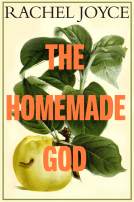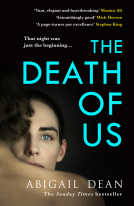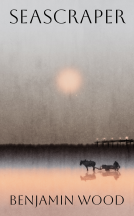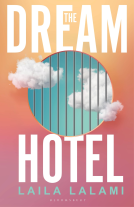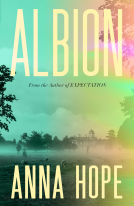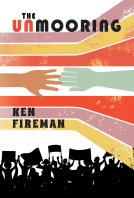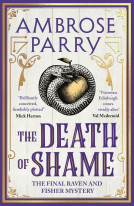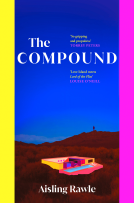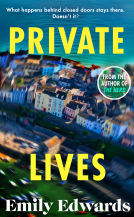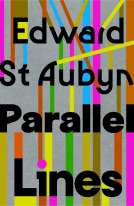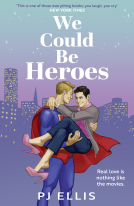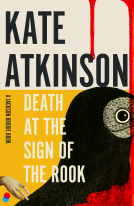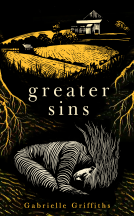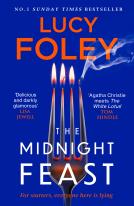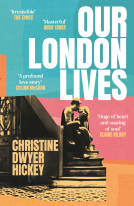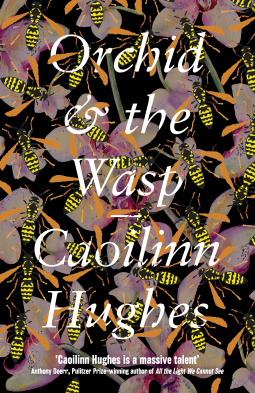
Orchid & the Wasp
by Caoilinn Hughes
This title was previously available on NetGalley and is now archived.
Send NetGalley books directly to your Kindle or Kindle app
1
To read on a Kindle or Kindle app, please add kindle@netgalley.com as an approved email address to receive files in your Amazon account. Click here for step-by-step instructions.
2
Also find your Kindle email address within your Amazon account, and enter it here.
Pub Date 7 Jun 2018 | Archive Date 12 Jul 2018
Talking about this book? Use #OrchidAndTheWasp #NetGalley. More hashtag tips!
Description
'Caoilinn Hughes is a massive talent.' – Anthony Doerr, Pulitzer Prize-winning author of All the Light We Cannot See
A dazzlingly original debut set in Dublin, London and New York, exploring the ethical underbelly of contemporary society through the coming-of-age of an utterly singular heroine: Gael Foess
Orchid & the Wasp brings to life the charged, compulsive voice of Gael Foess – daughter of a self-interested investment banker and a once-formidable orchestral conductor, and sister to a vulnerable younger brother – as she strives to build a life raft in the midst of economic and familial collapse. Moving by wits alone, Gael cuts a swathe through the leather-lined, coke-dusted social clubs of London, the New York gallery scene and birth-throes of the Occupy movement.
Written in heart-stoppingly vivid prose, Orchid & the Wasp is a modern-day Bildungsroman that chews through sexuality, class and contemporary politics and crackles with joyful fury and anarchic gall. It examines how we can fail our loved ones by what we want for them; what makes for a good life; what we are owed and what we must earn; and how events in our lives can turn us into people we never intended to be. A first novel of astonishing talent, Orchid & the Wasp announces Caoilinn Hughes as one of the most exciting literary writers working today.
Advance Praise
'A gorgeous novel told in an onrush of wit and ferocity...Caoilinn Hughes is a massive talent.'
Anthony Doerr, Pulitzer Prize-winning author of All the Light We Cannot See
‘An ambitious, richly inventive and highly entertaining account of the way we live now. Caoilinn Hughes writes with authority and insight, and her novel is as up-to-date as tomorrow's financial-page headlines.’
John Banville, author of The Sea
'Hughes's characters are rare, like no one you've read before. This is an entirely original novel, dazzling and beautiful, disturbingly cold and insistent.'
David Vann, author of Legend of a Suicide
Available Editions
| EDITION | Hardcover |
| ISBN | 9781786073655 |
| PRICE | US$12.99 (USD) |
Featured Reviews
 Nick B, Reviewer
Nick B, Reviewer
Orchid and the Wasp is a completely character driven novel. We spend ten or so years in the company of Gael Foess, a smart, sassy Irish girl growing up through the rise and fall of the Celtic Tiger. We open with Gael as an 11 year old girl selling “virginity” pills to her school friends to restore their hymens. Whether they work or not is immaterial – they work for Gael.
Then we meet Gael’s immediate family, her father Jarlath, a senior banker with Barclays, and her mother Sive, an internationally renowned orchestral conductor. Gael’s brother Guthrie is a delicate boy who is bullied at school. Gael seems to draw strength from her parents’ expectations, Guthrie seems to have given up trying.
Gael, like so many of her Gaelic ancestors, sets off to seek her fortune first in England and then in New York. Although she never takes success for granted, she displays no fear of failure. She is willing to blag, cheat and blackmail her way to the top. She’s like a computer gamer, wanting to get off to the fastest start possible or die in the attempt. She is willing to bet her last cent on an outside chance - she’s not even gambling on red and black, she’s putting her chips on the numbers. Except she knows the House has the edge, so she has to become the House.
There is a plot; it’s based on art and it only really starts half way through the book. Up until that point it is all just establishing the scene. While that happens, the reader may wonder whether it is going anywhere at all – the answer is oh yes, it certainly is!
But the plot is not the selling point. It’s the sidetracks within sidetracks. The romance with Harper, the start of the Occupy movement, the bohemian art forger. It is a comic delight in the same vein as The Sellout and Joshua Ferris. There are witty references and word games aplenty.
And at the end, the reader realises that Gael is not the grotesque and greedy figure we first imagined. Yes, she is a complete con artist. But only because she enjoys the conning; the rewards are incidental and can be given away lightly. We love her for it, but deep down we know that it is not a sustainable business model. Gael is Ireland, born of the earls and the Sidhe, her heart is captured by a Harp, her future uncertain but the present day is a gas.
Orchid and the Wasp is a fabulous novel and must be one of the best of 2018. It deserves to win prizes. Booker, anyone?
 Sam W, Reviewer
Sam W, Reviewer
Orchid & the Wasp is an accomplished debut novel. It is very confidently written, although it is not always clear what is going on. This makes a great companion to Darragh Martin's Future Popes of Ireland, which is also set in Ireland and New York during the same time period. Both are against the backdrop of the sub-prime mortgage driven crash, and subsequent austerity.
Capitalism is under the cosh here, although no lessons are learnt, or villains thwarted. The banks were bailed out, bonuses were paid out and world hasn't gone back to normal since.
The Foess Family are the centre of this story. Gael is the hero of this story. She is a hustler, and seems to make it up as she goes along to glorious effect. To quote Bruce Robinson's Thomas Penman, she has been “brought up like vomit”, by the most awful parents. Jarleth and Sive are so far up their own fundaments, the best Gael can hope for is benign neglect from Mum and aggression from Dad.
Key scenes show how crappy their parenting is. Gael, aged 11, walks in on Jarleth, who has just finished in the shower. He stands there, tumescent, and educates her on his infidelity and the parlous state of his (not) marriage. The scene is shocking in its' specificity. When Gael starts her period, she goes to see her mother. There is no sympathy, and no warmth from Sive, who is only engaged with her music.
Her younger brother Guthrie is brutally treated by Jarleth. What Dad sees as teachable moments to toughen him up are thinly veiled abuse. Sive is a conductor who is always away, while Jarleth is a merchant banker, and something else that rhymes with that. When the market crashes, Jarleth abandons the family for London. Sive reacts by flaking out and going to bed.
It is down to entrepreneurial Gael to make something happen. She knows from her father that capitalism is a rigged game, and sets out to make her mark. After getting her degree in London, and dodging love when offered, she finagles a first-class ticket to New York. What follows is a bravura display of chutzpah. Guthrie has had a terrible time back home, and Gael wants to transform his life in a single gamble.
In New York, we get a great exploration of the Occupy movement, another brush with love and an expose' of the art market. The book ends in triumph for Gael and Guthrie, whose story is so much more complicated than first appeared. Jarleth makes one last appearance. Like the banks, there are no consequences for him.
 Jim S, Reviewer
Jim S, Reviewer
This is an impressive book: emotionally complex; multilayered; and stylishly written. It's essentially a ‘rite de passage’ novel about a young woman, Gael, but it neatly undercuts the genre. Gael has a brother called Guthrie, younger than her and prone to fits. She has become his supporter and defender in place of her rich absent father, Jarleth, and her preoccupied mother, Sive, who is a composer and conductor. The other feature in the book is Art, Sive's new partner.
The book is arranged episodically and straddles almost ten years of Gael's life so we see her change and develop. This is where the title of the book comes in and it relates to the revolutionary evolutionary theories of Felix Guattari which, to summarise disgracefully, suggest that most theories of evolution reflect capitalist models and that the orchid and the wasp are not in a competition for survival but collaboration in the continual act of becoming like one another. 'Becoming' rather than getting somewhere is a key theme in the book and Gael has a nasty sting as well as being attractive.
Gael responds to the world as she sees it, aggressively making her way through a range of situations on the basis of her own judgements about what other people need and want. By the end of it, it is possible to see places where she has gone disastrously wrong. She misjudges Art and fails to make sense of her parents and what they want from life. She tries to act in Guthrie's interests and alienates him. She drives away Harper who wants to be her friend. She often goes for the simplistic truth rather than trying to unravel the complexities of situations. This is the act of becoming, trying stuff out, going down blind alleys and then trying something else.
I really liked that about the novel. We are not presented with a character that gradually becomes finished and polished. In fact, the ending of the book is enigmatic but what we do know is that she has already impacted on the lives of those around her.
In places the book is oddly poetic and, in others, there are arguments to be explored. The concept of negative and positive liberty - which societal doors are open and which are closed - is pivotal for Gael who achieves some outrageous entrances. When Sive explains about why Art is as he is, we realise the complexity of these characters. 'He won't talk about death to people who haven't experienced it. They can't relate and he doesn't want to make them try. That's a generosity. It's the most difficult thing; the existence of life's opposite, hovering over us always as a possibility.' That is good writing and an excellent read.
 Paula C, Librarian
Paula C, Librarian
Orchid and the Wasp is a maelstrom of a novel featuring Gael older protective sister of the delicate Guthrie. Gael is an unflinching anti-heroine who I admired for her ability to address situations in a world that still treats women as second rate citizens. Formidable intelligence combined with her own sense of self create a character well worth reading about. The language Caoilinn Hughes uses is at times lyrical often poetic and is a joy to read. The book appears disjointed at times but I believe this to be the author's construct to both endear and confuse the reader. I am deliberately not talking about the plot as I think each reader will take something different from this wonderful novel. I wholeheartedly recommend this book.
